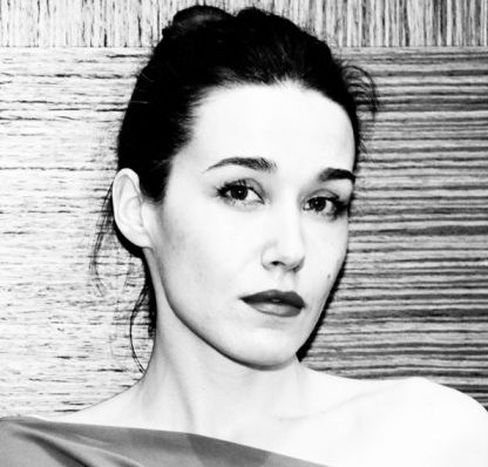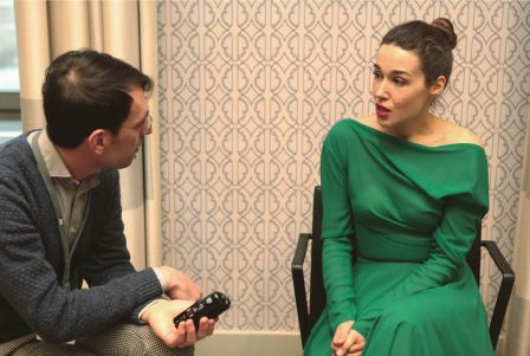
European Shooting Stars 2013 – Arta Dobroshi
Published on
Interview: Daniel Tkatch Foto: Katarzyna Swierc
Arta Dobroshi’s role in Lorna’s Silence (2008) directed by brothers Jean-Pierre and Luc Dardenne brought her a triple nomination for best actress and a worldwide renown. She is just back from Los Angeles where she received a best actress award at the Women's International Film & Television Showcase (WIFTS) for her role Trois mondes.
It was in L.A. that she got to know about her selection to be a European Shooting Star 2013.
 Somehow, your being here among the Shooting Stars doesn’t really seem suitable. Aren’t you a star that shines quite steadily already? How come you are here?
Somehow, your being here among the Shooting Stars doesn’t really seem suitable. Aren’t you a star that shines quite steadily already? How come you are here?
Thank you! Well, actually, when I did Lorna’s Silence my country could not nominate me because we were not a member of the European Film Promotion, we weren’t even a country back then. I’m not sure whether Belgium could have nominated me. I don’t really know how it works. I had many people telling me: But why are you a Shooting Star? And still, I really do appreciate being one.
What does it mean to you?
It’s really good. One meets casting directors and loads of other interesting people. You can initiate many contacts and even if there are people whom I already know it is still nice meeting them again. It’s good to have everybody at the same spot. It’s easier than going to individual castings. Shooting Stars exists since 1998, so for 16 years now, and a long time ago, when I was in Berlin in 2003, I was watching the Shooting Stars catalogue and booklet and I thought that that would be nice to become one. Additionally, it also means a lot to me as a way of saying to others that they should believe in their dreams. Because everything is possible, if you are persistent and you keep on believing in whatever makes you happy. It could be anything really. Above that, it’s the first time there is a Shooting Star from Kosovo. We had a war, you know, and so it sometimes gets emotional, for example when they called me on stage by my name followed by “Republic of Kosovo”. So far, we could never represent our country, because we didn’t have one and we were suppressed.
Are you still confronted with a lot of question about your origin and about your nationality?
Nowadays, it became much less of an issue. It is more about my acting now. But in the past the war was still a fresh memory. Until 1999 I practically lived in a war zone, where just being able to walk freely was a luxury. And here you have wonderful people taking care of you, promoting you and meeting you with a lot of good people, organizing interviews with them and so on. I mean, I appreciate it much more considering where I am coming from and the experience I’ve had.
Where does this dress come from, this astonishing green?
It was made by Krenare Rugova, a designer from Kosovo. She is really talented and we’ve been working together for years now. I was wearing her stuff in Cannes and other festivals. I love her stuff. It’s really feminine. But it also means a lot to me that I am wearing clothes from Kosovo. We are such a new country, you know.
Yes, you seem to be representing your country quite extensively. Is it, at least to some extent, a role imposed?
(laughs) Yeah... Good. I don’t think of it like that, so I am not under any pressure. I just try to be natural and down-to-earth about it, just enjoying the moment. I don’t think of representing, because then it becomes too much.
Being an actress probably means a lot of travelling. Can you say that you live somewhere specifically? Is there a place you call home?
No, I don’t yet have a base. I travel a lot, really a lot. Now I’m going to fly to New York and I was in L.A. just before. The world becomes smaller and smaller and it is so easy to travel now. It feels I am just changing neighbourhoods and not countries. You come to a neighbourhood and you spend there some weeks or months and then you go further. It helps to keep some routines though. I love swimming and dancing. So when I came here, the first thing I asked was: “Is there a swimming pool?”
And are you thinking about working with Dardenne brothers again?
Not for now. I exchanged emails with them a couple of days ago because I was selected for the César Award. They are in a phase of writing now. They normally take two years off to write and then they do pre-production etc. But also yes. It was great working with them and I would definitely do that again.
What women roles would you still like to play?
I would like to play a female version of Superman, the Superwoman. It would be great. One doesn’t have that many roles of women who are superheros and I since I was little I liked the figure of the Superman with that music and so on. We used to watch it a lot. And then I thought why not make a woman version of that role and play a Superwoman role, so she saves lives, goes around the world and flies. That would be great!
Were you exposed to a lot of Western film productions and culture in general when you were a child?
Oh yeah, we were watching a lot of that. We were very much connected to America through TV and culture. That was more America than Europe. We grew up with American films and music. We were watching that on TV. So I was probably very influenced.
Is it still like that? Are you still attracted more to US than to European productions?
Maybe. But now everything is more global. I was just in LA and you could see how close it is. Everything is very connected. This is how I feel now.
Are you perceived as a European in the US?
Now, so far just as Arta. Not like a European or as Balkan, it was more as an individual. After all we are all very different. How can one say here is a border and the person that leaves on that side is different from you. It is ridiculous.
Could you tell me something about your experiences during Berlinale 2009 when you were a member of the international short film jury and compare them to now?
In many aspects it was similar. I had a lot of interesting meetings with people, but I also had to watch a lot of film and decide. It is very crucial which film you choose. We watched around thirty films and at the end we unanimously chose David O’Reilly’s animation film Please Say Something. I later met him during the Sundance Film Festival where I was with the short film Baby and we spoke a bit. He was very excited to tell everybody: “She chose me, she chose me!” which was very sweet of him. It is so important to make the right decision as a jury because you are changing somebody’s life.
What are you working on nowadays?
I can’t say much about it for now. Only that it’s going to be in New York and will probably be shot in the next months. This is why I am going there as soon as I am done here.



